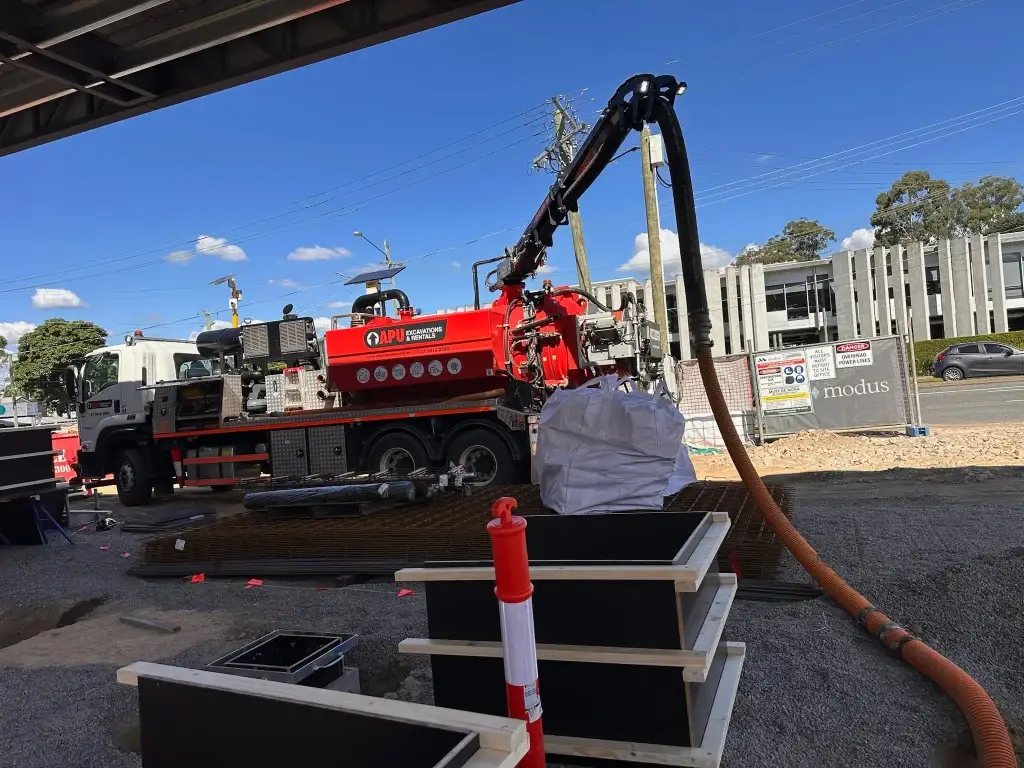Understanding Vacuum Excavation
Vacuum excavation is a non-destructive digging method that uses pressurised air or water to break up soil, which is then vacuumed into a debris tank. This process allows for safe and precise exposure of underground utilities, reducing the risk of damaging critical infrastructure like water mains, gas pipes, or telecom cables.
Unlike mechanical digging, vacuum excavation provides greater control and visibility, making it the preferred technique for projects in built-up areas or sensitive environments across civil, residential and commercial sectors.

How Does Vacuum Excavation Work?
The method relies on a two-step process:
- Soil loosening: High-pressure water (hydro excavation) or air is used to loosen the ground.
- Debris removal: A powerful vacuum system extracts the loosened soil and stores it in a tank.
The equipment used includes vacuum trucks (or vac trucks), which vary in capacity and features depending on project requirements. Some models include high-pressure jetters, ideal for breaking down compacted soil or clearing drain blockages simultaneously.
Benefits of Vacuum Excavation
1. Non-Destructive Digging
This technique is designed for safe excavation near buried services, making it ideal for service locating, trenching, and utility maintenance.
2. Increased Safety on Site
By avoiding the use of mechanical tools around fragile infrastructure, the risk of costly damage or injury is drastically reduced. Vacuum excavation also limits surface disruption and improves overall site safety.
3. Efficient and Clean Results
With vacuum excavation, there’s minimal mess and faster clean-up. The debris is contained, transported, and disposed of in accordance with environmental standards.
4. Versatile Applications
From drain cleaning and hydro jetting to emergency response after storms, vacuum excavation is used across plumbing, civil construction, telecommunications, and environmental projects.
When to Use Vacuum Excavation
This method is especially beneficial when working in:
- Urban areas with dense underground networks
- Sites requiring precision trenching or potholing
- Projects involving contaminated or unstable soil
- Locations where traditional excavation would be disruptive or risky
Vacuum excavation is commonly applied in:
- Utility location and mapping
- Drain and stormwater maintenance
- Environmental remediation
- Construction and infrastructure upgrades
Why It’s the Preferred Choice for Modern Projects
Today’s infrastructure and utility work demands accuracy, speed, and safety. Vacuum excavation ticks all these boxes, which is why many contractors, councils, and utility providers now specify it as the standard method for non-invasive digging.
For example, leading vac truck providers in Brisbane combine high-capacity equipment with certified operators to ensure compliance, environmental care, and operational excellence.
FAQs
What is the difference between vacuum excavation and hydro excavation?
Hydro excavation uses pressurised water to break up soil, while vacuum excavation refers to the suction process. Most modern setups combine both for efficient non-destructive digging.
Is vacuum excavation safe near live utilities?
Yes. It significantly reduces the risk of damaging underground networks, making it a much safer option than mechanical excavation methods.
Can vacuum excavation be used in wet or contaminated conditions?
Absolutely. Professional operators are trained and licensed to manage contaminated soil, and modern vac trucks are equipped to handle liquids, sludge, and slurry safely.
How far can a vac truck hose reach?
Hoses can extend up to 50 metres depending on the truck model, allowing flexibility on tight or complex sites.
Is vacuum excavation suitable for residential projects?
Yes. It’s ideal for tight access, small-scale works and plumbing or drainage jobs that require care and accuracy.
Looking for certified vac truck operators in Brisbane or the Gold Coast? Discover how APU Excavations & Rentals delivers expert vacuum excavation, hydro excavation, and non-destructive digging with same-day availability and unmatched service quality.
Explore our vac truck services or request a free quote today.
Need fast vacuum excavation across SEQ? APU offers 24/7 response with defence-cleared operators and a modern fleet ready for action. Whether it’s an urgent drain failure or a planned dig near critical services. We’ve got you covered.